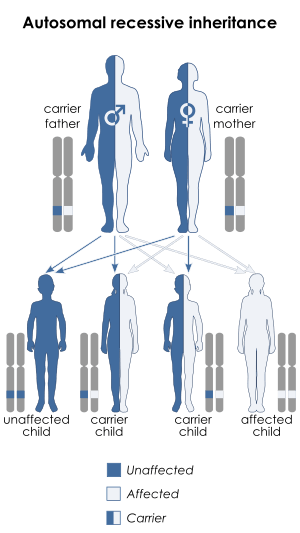Michels syndrome
Michels syndrome is a syndrome characterised by intellectual disability, craniosynostosis, blepharophimosis, ptosis, epicanthus inversus,[2][3] highly arched eyebrows, and hypertelorism.[3][4] People with Michels syndrome vary in other symptoms such as asymmetry of the skull, eyelid, and anterior chamber anomalies, cleft lip and palate, umbilical anomalies, and growth and cognitive development.[3][4]
| Michels syndrome | |
|---|---|
| Other names | Oculopalatoskeletal syndrome |
 | |
| This condition is inherited in an autosomal recessive manner[1] | |
| Specialty | Medical genetics |
See also
- Malpuech facial clefting syndrome, another condition in the 3MC spectrum
References
- "OMIM Entry - # 257920 - 3MC SYNDROME 1; 3MC1". omim.org. Retrieved 6 September 2017.
- Cunniff C, Jones KL (September 1990). "Craniosynostosis and lid anomalies: report of a girl with Michels syndrome". Am. J. Med. Genet. 37 (1): 28–30. doi:10.1002/ajmg.1320370108. PMID 2240039.
- Titomanlio L, Bennaceur S, Bremond-Gignac D, Baumann C, Dupuy O, Verloes A (September 2005). "Michels syndrome, Carnevale syndrome, OSA syndrome, and Malpuech syndrome: variable expression of a single disorder (3MC syndrome)?". Am. J. Med. Genet. A. 137A (3): 332–5. doi:10.1002/ajmg.a.30878. PMID 16096999.
- Al Kaissi A, Klaushofer K, Safi H, et al. (February 2007). "Asymmetrical skull, ptosis, hypertelorism, high nasal bridge, clefting, umbilical anomalies, and skeletal anomalies in sibs: is Carnevale syndrome a separate entity?". Am. J. Med. Genet. A. 143 (4): 349–54. doi:10.1002/ajmg.a.31610. PMID 17236195.
This article is issued from
Wikipedia.
The text is licensed under Creative
Commons - Attribution - Sharealike.
Additional terms may apply for the media files.